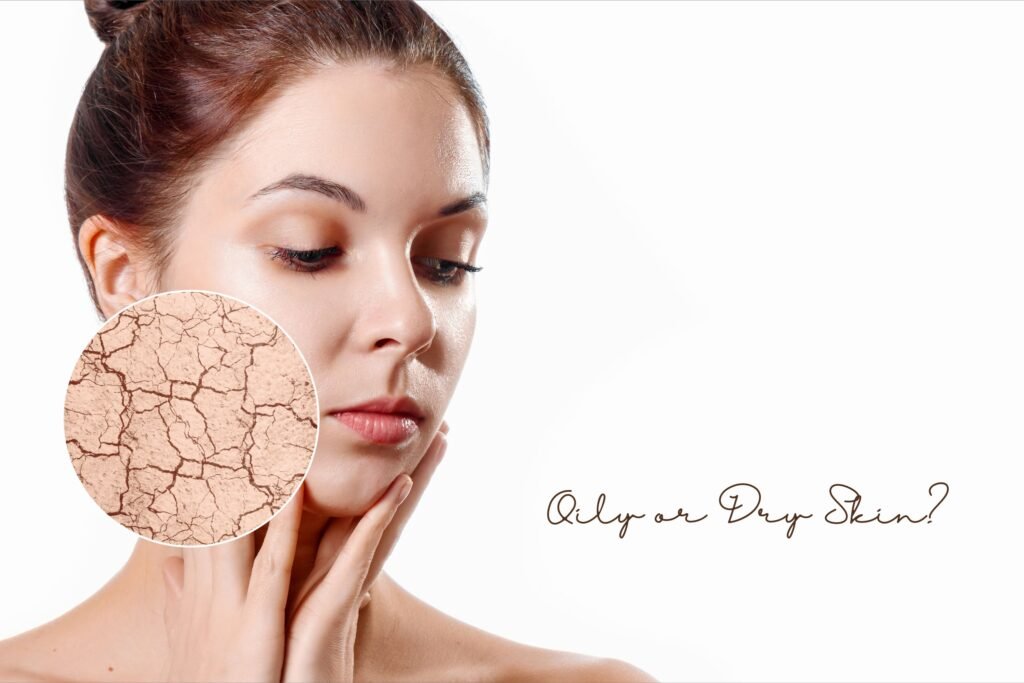Have you ever had the feeling after washing your face, that it feels like it’s shrinking around the cheeks. I have faced this situation and it’s not pleasant at all. This happens because of dry skin. A skin condition that occurs due to low oil production. But is low oil bad for our skin? Yes! Both excess and low production of oil is bad and concerning for your skin.
Oil works as a barrier to our skin. Barrier to dust and other foreign particles. Also oil keeps our skin soft and smooth. At any point, if you don’t hydrate yourself with enough water or liquids then your skin gets a message that it does not have enough water to keep the moisture, so it produces oil to lock the moisture of your face. Now the same condition occurs for dry skin type people but their skin does not have the capacity to produce oil at all. There can be many reasons behind it.
Dry skin is a common issue that affects many people, especially those between the ages of 30 and 38. It can lead to discomfort, itching, and even more severe skin problems if left untreated. In this guide, we will explore everything you need to know about dry skin, including its causes, symptoms, prevention tips, skincare routines, and more.
Symptoms of Dry Skin
- Tightness, especially after bathing or washing
- Rough or scaly texture
- Flaking or peeling
- Redness or irritation
- Itching or burning sensation
- Cracks or fine lines, sometimes leading to bleeding
Dry skin comes with many complications which can cause severe problems. Your skin color can get changed making it sensitive. Also it can make you prone to other liabilities.
Causes of Dry Skin
- Weather: Cold, dry winters and hot, dry summers can strip the skin of moisture. Weather with low humidity like the desert can strip off the moisture from your skin. Dry skin is worse in the winter with lower humidity.
- Aging: As we age, our skin produces less oil, leading to dryness. With the increasing age our oil glands dry up and lack the ability to produce oil to keep the skin moisturised. Also the collagen layer gets thinned that results in lack of elasticity.
- Harsh Skincare Products: Soaps, cleansers, and exfoliants with strong chemicals can damage the skin barrier. Applying too much synthetic product is nothing but foolishness. If you want yourself to be free from any dangers of skin then switch to natural products.
- Hot Showers & Baths: Prolonged exposure to hot water can strip away natural oils. Hot water can dissolve the oil in your body. That’s why it is much safer to use cold water during a shower.
- Medical Conditions: Eczema, psoriasis, and thyroid disorders can lead to persistent dry skin. These conditions can cause dry skin and irritation because of particular genes.
- Low Humidity Levels: Indoor heating and air conditioning reduce moisture in the air, leading to drier skin.
Complications of Dry Skin
- Cracked and Bleeding Skin: Severe dryness can cause the skin to crack, leading to discomfort, pain, and even bleeding. Open cracks also increase the risk of infections.
- Persistent Itching and Irritation: Chronic dryness can make the skin more sensitive and prone to inflammation, leading to discomfort and scratching.
- Increased Risk of Infections: Bacteria and fungi can enter through cracked skin, causing infections like cellulitis.
- Premature Aging and Wrinkles: Lack of moisture can weaken the skin’s elasticity, leading to fine lines and wrinkles appearing earlier than expected.
- Eczema or Dermatitis Flare-Ups: People with conditions like eczema may experience worsened symptoms when their skin is dry.
- Rough and Scaly Skin Texture: Untreated dryness can cause the skin to become rough, flaky, and visibly unhealthy.
Prevention Tips for Dry Skin
Preventing dry skin starts with adopting the right skincare and lifestyle habits. First, always use a gentle, fragrance-free cleanser that does not strip your skin of its natural oils.
After cleansing, apply a rich, hydrating moisturizer immediately while your skin is still slightly damp to lock in moisture. Drinking plenty of water is also crucial, as internal hydration reflects on your skin’s health.
To combat environmental factors, use a humidifier in dry indoor spaces to maintain adequate moisture levels in the air. When showering or washing your face, opt for lukewarm water instead of hot, as hot water can strip away essential oils and worsen dryness.
Choosing skincare products wisely is another key factor, look for ingredients like hyaluronic acid, glycerin, and ceramides that help replenish moisture. Additionally, avoiding harsh skincare ingredients such as alcohol, sulfates, and artificial fragrances can prevent irritation and further dryness.
Protecting your skin from harsh weather conditions is equally important, so always wear protective clothing in cold, dry climates and apply sunscreen daily to prevent damage from UV rays. By following these simple yet effective steps, you can keep your skin healthy, hydrated, and free from dryness.
Types of Dry Skin
Dry skin can manifest in different forms, depending on the underlying cause. Understanding these types can help in choosing the right treatment and skin care approach.
- Contact Dermatitis occurs when the skin reacts to an irritant or allergen, leading to redness, dryness, and sometimes itching or blistering. Common triggers include harsh soaps, fragrances, detergents, and certain metals like nickel.
- Atopic Dermatitis (Eczema) is a chronic condition characterized by extremely dry, inflamed, and itchy skin. It often runs in families and can be triggered by allergens, stress, or environmental factors. Without proper care, it can lead to flare-ups and persistent discomfort.
- Seborrheic Dermatitis primarily affects areas of the skin with high oil production, such as the scalp, nose, and eyebrows. Although it involves dryness, it can also cause flaking, redness, and irritation, often mistaken for dandruff.
- Ichthyosis is a group of genetic skin disorders that result in severe dryness and scaling. The skin appears thick, rough, and scaly, often resembling fish scales. This condition usually requires specialized skincare and medical treatments to manage symptoms effectively.
Each type of dry skin has unique causes and treatment approaches, so identifying the specific condition can help in maintaining healthy and hydrated skin.
Who Does Dry Skin Affect?
Dry skin can affect anyone, but certain factors make some people more prone to it. Here are the most common groups affected:
- People in cold, dry climates: Low humidity and harsh weather conditions strip moisture from the skin.
- Individuals over 30: Natural oil production decreases with age, leading to drier skin.
- Those with a genetic predisposition: Conditions like eczema and psoriasis often run in families.
- People who use harsh skincare products: Soaps, alcohol-based toners, and over-exfoliation can damage the skin barrier.
- Individuals who take hot showers or baths frequently: Prolonged exposure to hot water removes natural oils from the skin.
- People with medical conditions: Thyroid disorders, diabetes, and other health issues can cause skin dryness.
- Those exposed to air conditioning or heating for long hours – Indoor environments with artificial heating or cooling reduce moisture levels in the air.
How Does Dry Skin Affect My Body?
Dry skin doesn’t just affect your appearance; it can cause:
- Persistent itchiness and discomfort
- Cracking that can lead to infections
- Increased sensitivity to allergens and irritants
- Uneven skin texture and premature aging
How Do I Know If I Have Dry Skin?
- Flaky, rough patches
- Redness and irritation
- Tightness, especially after cleansing
- Increased sensitivity to skincare products
To check if you have dry skin or not you can try a method. For this, wash your face with a gentle cleanser. Air dry your face after that. Then wait for about 3-4 minutes. If you feel that your skin is shrinking and feels like it will tear then you have dry skin.
Ingredients to Look for in Dry Skin Products
- Hyaluronic Acid: Retains moisture and plumps the skin.
- Glycerin: Attracts water to the skin’s surface.
- Ceramides: Strengthen the skin barrier.
- Shea Butter: Provides deep hydration.
- Squalane: Mimics natural skin oils and prevents moisture loss.
- Oatmeal Extract: Soothes irritation and calms inflammation.
Dry Skin Skincare Routine
Morning Routine:
- Use a hydrating cleanser.
- Apply a hyaluronic acid serum.
- Follow with a ceramide-rich moisturizer.
- Use a broad-spectrum sunscreen (SPF 30+).
Night Routine:
- Cleanse with a gentle, non-stripping cleanser.
- Apply a nourishing facial oil or serum.
- Use a thicker night cream to lock in moisture.
- Consider an overnight hydrating mask.
How to Choose a Sunscreen for Dry Skin
Whether you are an oily skin type or dry skin type. You have to use sunscreen for overall protection from the UV rays. A good sunscreen is like a best friend. Choose something which will give you protection without cracking the skin.
- Hydrating ingredients like hyaluronic acid and glycerin.
- Cream-based or lotion formulas (avoid gels or alcohol-based formulas).
- Broad-spectrum SPF protection (30 or higher).
How to Do Makeup for Dry Skin
- Use a Hydrating Primer: Helps smooth and prep the skin. This will lead to a smooth base for the makeup without cracking it up.
- Opt for Liquid Foundations: Avoid matte or powder-based formulas. Powder based foundations will not set up on your face that’s why use liquid foundation with full coverage.
- Apply Cream Blush and Highlighter: Adds a natural, dewy glow. Again, powder formula will not set properly on a dry skin type.
- Set with Hydrating Mist: Prevents makeup from settling into dry patches.
Diet for Dry Skin
- Hydrating Foods: Watermelon, cucumbers, oranges
- Healthy Fats: Avocados, nuts, olive oil
- Omega-3s: Salmon, flaxseeds, chia seeds
- Antioxidants: Berries, dark leafy greens, green tea
- Collagen-Boosting Foods: Bone broth, eggs, citrus fruits
When to See a Doctor
Consult a dermatologist if:
- Your skin remains dry despite regular moisturizing.
- You experience severe redness, cracking, or pain.
- Your dry skin is accompanied by rashes or blisters.
- You have symptoms of an underlying medical condition like eczema or psoriasis.
FAQs
How Does Dry Skin Look Like?
Dry skin appears flaky, rough, and sometimes red or irritated. After washing it feels like tearing up. Also makeup looks cracky.
Can Dry Skin Become Oily?
Yes, if your skin overcompensates for dryness by producing excess oil. With the change of weather and use of different products, dry skin can become oily.
What Causes Dry Skin Near the Mouth?
It can be due to weather, allergies, or using harsh toothpaste or lip balms.
Dry Skin vs. Eczema: What’s the Difference?
Eczema includes inflammation, redness, and intense itching, while dry skin is mainly rough and flaky.
What Causes Dry Skin?
Factors like weather, age, genetics, and skincare habits contribute to dry skin.
Why Does My Skin Get So Dry in Winter?
Cold air, indoor heating, and lower humidity levels strip moisture from the skin. In winter the humidity level is low. That results in stripping of moisture from your skin faster.
Why Is My Skin Suddenly So Dry and Flaky?
Have you changed your living place? Or change your diet and all. If you have changed them then your skin is showing symptoms of dry skin. Also harsh chemicals can lead to dry skin.
How to Cure Dry Skin on Legs?
- Moisturize immediately after showering.
- Use gentle, hydrating body washes.
- Apply body oils or thicker creams overnight.




